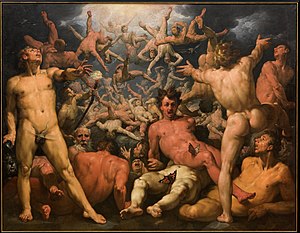
Back Titaan (mitologie) Afrikaans Titan (Mythologie) ALS تيتان Arabic تايتن ARZ টাইটান Assamese Titán (mitoloxía) AST Titanlar Azerbaijani Titan BAR Тытаны Byelorussian Тытаны BE-X-OLD

| Greek deities series |
|---|
| Titans |
In Greek mythology, the Titans (Ancient Greek: οἱ Τῑτᾶνες, hoi Tītânes, singular: ὁ Τῑτᾱ́ν, -ήν, ho Tītân) were the pre-Olympian gods.[1] According to the Theogony of Hesiod, they were the twelve children of the primordial parents Uranus (Sky) and Gaia (Earth), with six male Titans—Oceanus, Coeus, Crius, Hyperion, Iapetus, and Cronus—and six female Titans, called the Titanides (αἱ Τῑτᾱνῐ́δες, hai Tītānídes) or Titanesses—Theia, Rhea, Themis, Mnemosyne, Phoebe, and Tethys.
After Cronus mated with his older sister Rhea, she bore the first generation of Olympians: the six siblings Zeus, Hades, Poseidon, Hestia, Demeter, and Hera. Certain descendants of the Titans, such as Prometheus, Atlas, Helios, and Leto, are sometimes also called Titans.
The Titans were the former gods: the generation of gods preceding the Olympians. They were overthrown as part of the Greek succession myth, which tells how Cronus seized power from his father Uranus and ruled the cosmos with his fellow Titans before being in turn defeated and replaced as the ruling pantheon of gods by Zeus and the Olympians in a ten-year war called "the Titanomachy" (Ancient Greek: ἡ Τῑτᾱνομαχίᾱ, romanized: hē Tītānomakhíā, lit. 'a battle of Titans'). As a result of this war, the vanquished Titans were banished from the upper world and held imprisoned under guard in Tartarus. Some Titans were apparently allowed to remain free.
- ^ Hansen, p. 302; Grimal, p. 457 s.v. Titans; Tripp, p. 579 s.v. Titans; Rose, p. 1079 s.v. Titan; Smith, s.v. Titan 1..